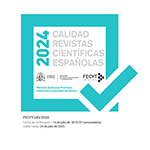Rurality and social work: a perspective from Andalusia
Abstract
Social work in rural areas, in contrast to its configuration in urban settings, is conditioned by particular organisational circumstances and socio-cultural contexts that call for reflection on its possible specificity. In this sense, the practice of social work in rural contexts is a specific challenge for the profession. The aim of this article is to analyse the organisational models and practice of social work in a rural context in order to investigate this potential particularity and its implications for social intervention. The research focuses on an exploratory case study in Andalusia (Spain), where we have developed a qualitative research in 14 community social services centres through in-depth interviews with 95 social workers. Through these interviews we have been able to identify some of the characteristics of the organisation and practices of social workers in rural contexts. The results highlight two fundamental differences with intervention in urban contexts: (1) a different model of service organisation, with a generalist tendency; and (2) a particular professional practice, based on personal proximity and care. In the discussion section, the particularities of rural social work is highlighted: the professionals recognise that they are doing social work that is "different" from that in urban contexts, more aligned with the profession "ought" and "is". The conclusions point to the existence of an urbanormativity bias in the organisation and practices of social work which makes rural peculiarities invisible and which could condition its capacity to respond to the rural crisis.
Downloads
Article download
License
In order to support the global exchange of knowledge, the journal Cuadernos de Trabajo Social is allowing unrestricted access to its content as from its publication in this electronic edition, and as such it is an open-access journal. The originals published in this journal are the property of the Complutense University of Madrid and any reproduction thereof in full or in part must cite the source. All content is distributed under a Creative Commons Attribution 4.0 use and distribution licence (CC BY 4.0). This circumstance must be expressly stated in these terms where necessary. You can view the summary and the complete legal text of the licence.









